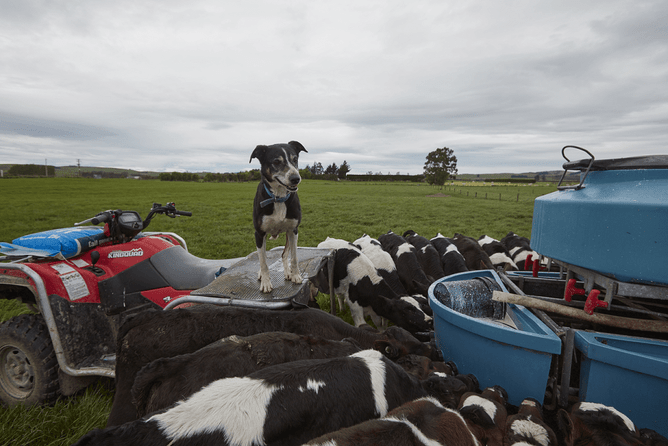Milk powders containing coccidiostats can be beneficial when feeding young animals, but can be lethal if ingested by our pets.
Picture this: cold, early mornings, mixing milk powder and warm water for our lambs and calves to get a belly full of warm milk for breakfast. Your trusty farm dog sniffing around in the background. You are thinking about the long list of things you need to get done that day. What you don’t need is an unexpected trip to the vet clinic with a very sick dog!
Using milk powder to feed our young animals is common practice on Southland farms, whether you are a large operation or a small lifestyle block.
While these powders contain the ingredients your youngstock need to thrive, some are incredibly dangerous to dogs and cats.
Paws off the coccidiostats
Some milk powders, particularly those intended for agricultural animals, may contain coccidiostats. These prevent or treat coccidiosis, a parasitic infection commonly found in farm animals.
However, they are not approved or safe for dogs and cats. Pets ingesting milk with coccidiostats can suffer from adverse effects, or even toxicity.
Common signs to look out for
Here are some common indications of coccidiostat poisoning in dogs:
Gastrointestinal distress. Dogs may experience vomiting, diarrhoea (which may be bloody) and abdominal pain. These symptoms can range from mild to severe, depending on the level of exposure and the individual dog's sensitivity.
Loss of appetite. Dogs may show a decreased interest in food or refuse to eat altogether. This can contribute to weight loss and dehydration if not addressed promptly.
Lethargy and weakness. Dogs may appear tired, lack energy, and have difficulty moving or standing.
Neurological signs. These may include disorientation, confusion, tremors, seizures, or even coma. Neurological signs typically indicate a more severe poisoning and require immediate veterinary attention.
Increased thirst and urination, due to the toxic effects of coccidiostats on the kidneys.
If you are concerned that your dog may have gotten into the milk powder bag, or helped himself to the calves’ milk, it is crucial to seek veterinary assistance immediately. Prompt veterinary care can help mitigate the effects of poisoning and improve the chances of a successful recovery.
We recommend knowing what ingredients are in your milk powder and getting into the habit of washing out any leftover milk immediately, while always keeping an eye on your dog or cat roaming the pens!
Check the label to see if the milk powder you are using contains coccidiostats.

